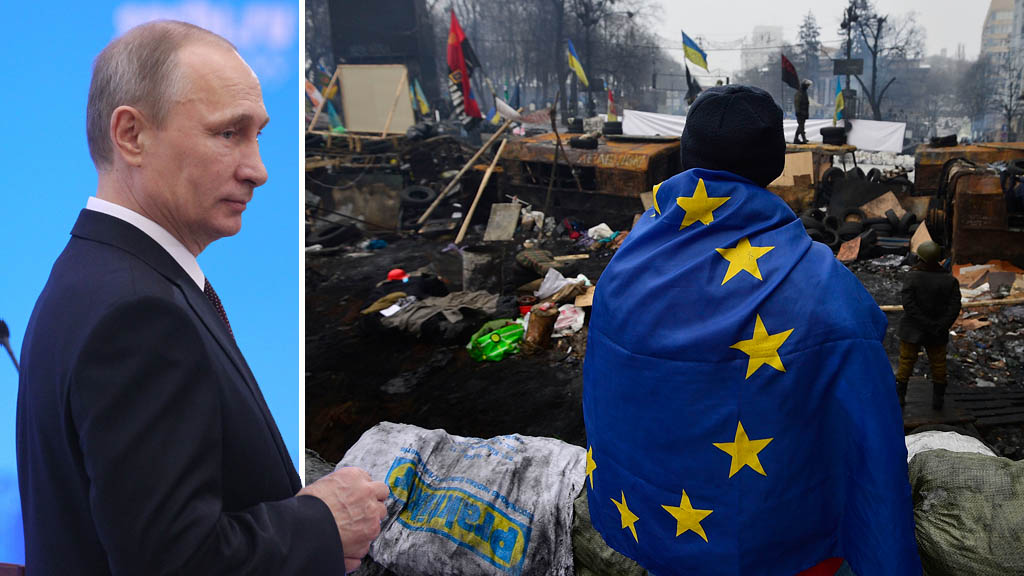Could Russia invade Ukraine?
A bruised Russia has seen its sphere of influence reduced by what it perceives to be western interference – but is military retaliation likely?

The prospect of Russian tanks rolling towards Kiev is extremely unlikely, but there are ways, especially in the Crimean peninsula in the south of the country, in which Russia could justify a military presence in its pro-European neighbour.
According to Sir Andrew Wood, an associate fellow at Chatham House and a former British ambassador to Russia, ways to explain a military presence in the east of the country could be found.
“The most probable form of direct Russian interference would be in relation to Crimea where they have substantial forces and substantial intelligence, and where they have distributed Russian passports,” he told Channel 4 News.
They could argue that it was not part of the historic Ukraine. It was something that Khrushchev gave away whilst he was drunk or something. There are people in Russia that would buy that sort of argument. Sir Andrew Wood, former British ambassador to Russia
“They could be claiming to protect Russian citizens as they did in Ossetia and Abkhazia.”
“Their ability to stir up internal unrest is proportionally relatively high. They could stir up unrest and then send in people as protection.”
‘Armed mutiny’
His comments chime with a statement from Russian Prime Minister Dmitry Medvedev, who said on Monday that there is a “real threat to our interests and the lives of our citizens”. He said the uprising in Kiev was an “armed mutiny” and that foreign support for it is an “aberration”.
However, Sir Andrew said that, though Russia appears to be “extremely angry” at the events in Ukraine, it would not necessarily be “sensible” to stir up trouble in the east.
He did say, though, that the Crimea region of the country, which traditionally has the closest affiliation with Russia, is a “particular issue”.
Sevastapol, on the Crimean peninsula, remains a base for the Russian navy and the population is majority Russian.
In the Crimean city of Kerch on Saturday, pro-Russian demonstrators clashed with Maidan protesters (see video, below – warning: some viewers may find the violent images distressing).
Russia also said on Monday that the concerns of MPs in the Crimean peninsula, as well as the east and south of the country, must be listened to.
Sir Andrew said: “They could argue that it was not part of the historic Ukraine. It was something that Khrushchev gave away whilst he was drunk or something. There are people in Russia that would buy that sort of argument.”
Price of gas
One possible Russian reaction would be through economic means – pushing up the price of gas, or halting the movement of European goods across the Ukrainian border.
On Monday Eduard Stavytsky, Ukraine’s acting energy minister, said he hoped the price the country pays for Russian gas would not change. Russia lowered the price that Ukraine pays for gas at the end of December as a part of the deal that saw ousted President Viktor Yanukovych walk away from closer ties with the EU.
Such economic measures would be unlikely to convince Ukrainian people to change their minds, argues Sir Andrew.
“There is an urge within Ukraine to form a more accountable law-based form of government and not to follow the Russian model which is further down the road to the authoritarian system,” he said.
Indeed, Sir Andrew argues that it is this strength of feeling amongst the majority of Ukrainian people that Russia has consistently misjudged.
He points out that Russia’s record in the Ukraine is “not endearing” since the annexation of the western Ukrainian territories in 1939.
“Russia has got it wrong in judging what it was that Ukrainians wanted, in judging their degree of support, in judging the degree to which Yanukovych could get on top through indirect or implied use of force,” he said.
But, Sir Andrew argues, it is likely that Russia will do “the most sensible thing” – “say very little about it apart from that they want stability, and see how things work out over the next days and weeks.”